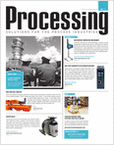Recommended :
Subscribe FREE - Legal Aspects of Incident Investigation
 7 months ago, on February 16, 2007, 2.09pm, a big blast in Valero McKee Refinery in Sunray, Texas, 65 miles North of Amarillo. This major event has occurred in the Propane Deasphalting unit and caused three workers critically injured, and the major refinery shut down for two months.
7 months ago, on February 16, 2007, 2.09pm, a big blast in Valero McKee Refinery in Sunray, Texas, 65 miles North of Amarillo. This major event has occurred in the Propane Deasphalting unit and caused three workers critically injured, and the major refinery shut down for two months.
Subscribe FREE - Legal Aspects of Incident Investigation
 7 months ago, on February 16, 2007, 2.09pm, a big blast in Valero McKee Refinery in Sunray, Texas, 65 miles North of Amarillo. This major event has occurred in the Propane Deasphalting unit and caused three workers critically injured, and the major refinery shut down for two months.
7 months ago, on February 16, 2007, 2.09pm, a big blast in Valero McKee Refinery in Sunray, Texas, 65 miles North of Amarillo. This major event has occurred in the Propane Deasphalting unit and caused three workers critically injured, and the major refinery shut down for two months.CSB has conducted investigation and release it final report on July 09, 2008. As per the studies, the major cause of this accident was foreign material inhibit proper isolation resulted water passing a isolation valve, ice formed in a isolated dead leg during cold weather and ice expansion [1] caused the dead leg piping cracked. Once the ice is melted, large amount of propane is leak through the crack and jet fire form. Jet fire further damage another flange and generated another jet fire impinged on a major non-fireproofed piperack. Finally piperack collapsed resulted major release of flammable hydrocarbon and serious plant fire.
[1] : Why does water expand when it freezes?
[1] : Why does water expand when it freezes?
Dead leg piping cracked due to ice expansion
Pressurized propane leak via crack
Valero Refinery Propane Fire Safety Video
Details investigation report can be downloaded via this link (click here).
From the investigation, several observations in API code & standard have been reported :
- API guidance does not specifically discuss the use of remotely operated Shut-off valve (ROSOV) in controlling jet fires
- API recommends structural steel fireproofing upto 50 feet. However, the CSB investigation found the fire damage can reach 77 feet.
- Radiation caused the LPG storage external paint blistering as a result of operator could not initiate the deluge system on LPG tank due the valve is too close to the incident area
- Hazard Analysis has not evaluated the storing of Chemical product i.e Chlorine in the plant. API do not require hazards analysis from nearby unit when locating fire water deluge valves
- identification of infrequently used piping or equipment subject to freezing
- establishment freeze protection written program
- specific approaches to eliminate freeze hazards
- periodic inspections
- addresses jet fire scenarios, use of protective fireproofing and other measures (e.g., emergency isolation valves, depressuring systems)
- Use remotely operated Shut-off valve (ROSOV) and interlocked equipment controls for quick isolation
- effective deluge system activation during emergencies
- replacing chlorine with biocide for cooling water
Subscribe FREE - Processing Magazine
 Most of above recommendations have also been discussed in "Protective Measures against FIRE other than Pressure Relief Device (PRD)" and "Some Comments on Providing External Insulation as Protective Measure against FIRE".
Most of above recommendations have also been discussed in "Protective Measures against FIRE other than Pressure Relief Device (PRD)" and "Some Comments on Providing External Insulation as Protective Measure against FIRE".Those design trying to eliminate fire scenario in the plant as discussed "Extra Caution When Eliminating Overpressure by Fire Attacks" shall be addressed carefully and extra effort shall be put in .
Source :
CSB - Valero Refinery Propane Fire
Report: Valero refinery fire caused by leak
Related Post
No comments:
Post a Comment
Let us know your opinion !!! You can use some HTML tags, such as <b>, <i>, <a>